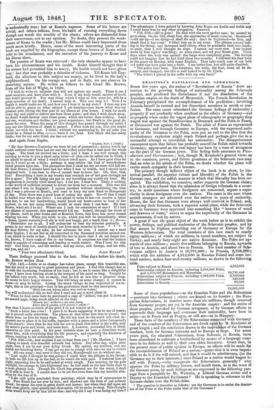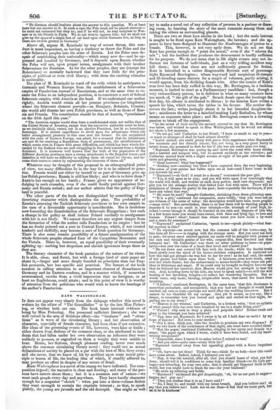ERASINSEI'S PANSLAVISM AND GERMANISM.
SOME few years ago, the author of "Revelations of Russia" drew at- tention to the growing feelings of nationality among the Sclavonio
peoples, and predicted the disturbance if not the dissolution of the Austrian empire on the death of Metternich. The French Revolution in February precipitated the accomplishment of his prediction ; involving Austria herself in turmoil and her discordant members in revolt or con- fusion. The same cause stimulated the German feelings of nationality ; properly if not prudently when confined to the affairs of Germany—not so properly when under the vague pleas of ethnography or geography they waged war against the Scandinavians in Denmark and the Poles in Posen, or threatened war against the Dutch. The affair of Posen as represented to Germany, and through Germany to Europe, with the expressed anti-
pathy of the Germans to the Poles, soon put an end to the idea that the revolutionary explosion might reach Poland and perhaps give rise to a
successful attempt to reUstablish her nationality. The disappointment consequent upon that failure has probably soured the Polish mind towards Germany, aggravated as the real injury has been by a tone of arrogance
on the part of the German press. This feeling finds utterance in Pan- slavisnt and Germanism ; but, though M. Krasinski's general views as to the numbers, power, and future greatness of the Selavonic race may find an echo in the minds of the Poles, we doubt whether his plans will excite much sympathy in their bosoms.
The primary though indirect object of the book is to show, by his- torical parallel, the superior virtues and liberality of the Polish to the German race, and the selfish manner in which that liberality has been re- quited. The exhibition, we conceive, rather supports the German claim; since it is always found that the admission of foreign tribunals in a coun- try, to settle questions where foreigners are concerned, argues a supe- riority in those foreigners over the natives. The same is the case where settled strangers are advanced over the natives to posts of authority. Hence, the fact that Germans were always well received in Poland, and, advancing their fortunes, took a superior social place, while the Sclavonia races in Germany were oppressed into something like "hewers of wood and drawers of water," seems to argue the superiority of the Germans in acquirements, if not by nature.
A great if not the great object of the work before us is to exhibit the power, feelings, and political tendencies of the Sclavonic peoples, and by
that means to frighten something out of Germany or Europe for the Western Sclavonians. The total numbers of this race reach to nearly eighty millions; of which six millions, in round numbers, are subject to Turkey, and nearly forty-eight are native Russians. The Poles are up- wards of nine millions ; nearly five millions belonging to Russia, upwards of two to Austria, and about two to Prussia. The total number of Sole- vonians subject to Austria is 16,791,000; to Prussia, 2,108,000.; which with the addition of 4,912,000 in Russian Poland and some iso- lated settlers, makes four-and-twenty millions, as shown in the following table.
Poles subject to Russia-
Sclavonians subject to Austria, incuding 2,341,000 Poles, and 4,370,000 Bohemians and Moravians 16,791,000 Sclavonians subject to Prussia, including 1,982,000 Poles 2,108,000 Sclavonians in Cracow 180,000 Sclavonians in Saxony 60,000 24,001,000 Some of these populations—as the Prussian Poles and the Bohemians —penetrate into Germany ; others are Seated on its frontier ; the Hun- garian Sclavonians, in number more than six millions, though removed from Germany proper, are yet in the Austrian empire : , and the entire of these peoples, provoked by German arrogance, or by German efforts to supersede their language and overcome their nationality, have been in arms—as in Posen and at Prague, or still are—as in Hungary.
These facts of the numbers of the Sclavonians connected with Germany and of the conduct of the Sclavonians are dwelt upon by M. Krasinski at great length ; and the conclusion drawn is the imprudence of the German conduct, both for German interests and to Europe at large. For some years past, the educated Sclavonians, from Bohemia to Russia, have been stimulated to cultivate a brotherhood by means of a language com- mon in its dialects as well by their own olden literature. Grant that, in the present state of public opinion in Europe, no efforts will be made for the reestablishment of Poland as a nation,—grant that it is even impos- sible to do it if the will existed, and that it would be mischievous, (as the Germans say to their interests) since Poland as a nation would league it- self with France,—why exasperate the Sclavonians generally ? why oppress the Poles by military licence, and insult them, as is the wont of the German press, by such feelings as are expressed in the following pas- sage from a pamphlet by Mr. Wuttuke, a Liberal German writer and a Deputy to the Frankfort Parliament? He is speaking in reference to the German claims over the Polish cities.
"The question is therefore as follows: are the Germans to be under the domin4 ion of the Poles or the Poles under that of the Germans ? 6N German should' hesitate about the answer to this question. We at least have but one answer to it In such a case the Pole must not be placed aboveus- he must not command but obey us; and if he will not, he may emigrate to War- saW or to his friends in Paris. We do not wish to oppress him; but we shall not give up the space of a single foot of our land upon which Germans live, as long as One are swords ground in Germany."
Above all, argues M. Krasinski by way of covert threat, this con- duct is most imprudent, as having a tendency to throw the Poles and the other Sclavonio peoples into the arms of Russia. Let the Poles once de- spair of establishing their nationality—which many now do—and be op- pressed and insulted by Germany, and it depends upon Russia whether the Poles will not, upon proper terms, amalgamate with their brother Solavonians the Russians. As for the other peoples, they are (except the Bohemians) so mentally backward that they care little for the prin- ciples of political or even civil liberty; with them the exciting stimulus is nationality. The plan of M. Krasinski to ward off the evils which he anticipates to Germany and Western Europe from the establishment of a Sclavonian empire of Pauslavism instead of Russianism, and at the same time to re- store the Poles to an independent position is to construct a sort of federal Sclavonic empire, with Austria-at the head. If we understand our author rightly, Austria would retain all her present provinces (or kingdoms) where the Sclavonic element prevails—as Hungary, Bohemia, Croatia; she would add thereto her own Polish provinces, as well as those of Rus- sia and Prussia. The constitution should be that of Austria, "proclaimed on the 25th April this year."
"The Austrian empire would thus form a confederated state not unlike that of the United Statea of America, except that the executive authority must be here, &LW decidedly think, vested, not in an elective President, but in an hereditary Sovereign. It is almost superfluous to dwell upon the advantages which the latter arrangement presents in this case over the former. No one acquainted with the state of Eastern Europe, can admit for a moment that its inhabitants are now fit for receiving a Republican form of government, the establishment of which meets even in France with great difficulties, and which has been wisely dis- carded by the Italians who are now straggling to free their country from a foreign dominion. It is moreover well known that the bulk of the population of the different Austrian provinces have a strong attachment to the Imperial house; and therefore it will have no difficulty in rallying them all round its throne, and be- come their common centre by representing the interests of them all."
Whatever may be-thought of this proposal in an ethnographical point of view, too many difficulties lie in the way for it to be reduced to prac- tice. Prussia would not either by herself or as part of Germany give up her Polish provinces; Russia is still less likely; and who is to force them ? Atlatria has enough on her hands ; France gives no appearance of in- dulging in such crusades, even if she could finally prevail against Ger- many and Russia united; and our author admits that the policy of Eng- land is peaceful. The other parts of the book are distinguished by something of the theorizing character which distinguishes the plan. The probability of Russia's annexing the Turkish Sclavonic provinces to her own empire in the case of a favourable opportunity is considerable. She is doubtless now fomenting the dissatisfaction of the Sclavonic Hungarians ; but such a change in her policy as shall induce Poland cordially to amalgamate with her is not likely. We cannot therefore see any urgent danger from the fbrmation of what the author calls Panslavism or its empire : but he has no doubt pointed out a sore in Central Europe, which, if not treated tenderly and skilfully, may become a sort of Irish question for Germany. There is also some remote possibility of a future amalgamation of the whole Sclavonic peoples situated East of the Carpathian Mountains and the Vistula. There is, however, an equal possibility of their eventually splitting up: nothing but despotism and slavish ignorance keeps them as they are.
The literary character of the book partakes of the nature of its views. It is able, clear, and fluent, but with a foreign kind of state paper air about it,—larger and more deeply founded on principles than our Eng- lish protocols, but less specific and practical. The feature of the book consists in calling attention to an important element of disturbance in Germany and he Eastern confines, and in a manner which, if somewhat overstrained, results from a vivid impression that no foreigner, or at least no Englishman, could attain; and in this point of view it is worthy of attention from the politician who would wish to know the bearings of the author's Pttnslavism.



























 Previous page
Previous page